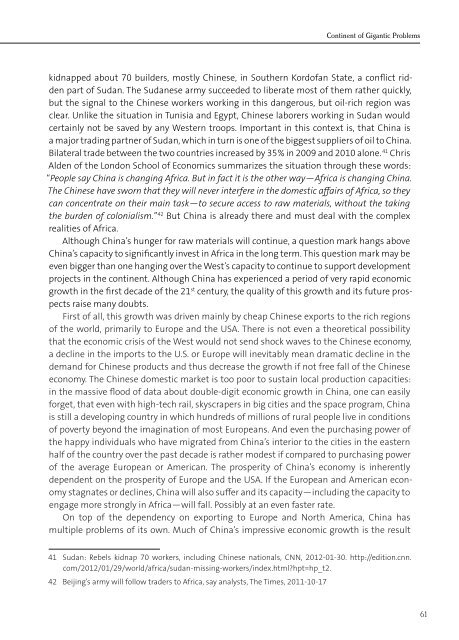Giant_and_Dwarf-FIN
Giant_and_Dwarf-FIN
Giant_and_Dwarf-FIN
You also want an ePaper? Increase the reach of your titles
YUMPU automatically turns print PDFs into web optimized ePapers that Google loves.
Continent of Gigantic Problemskidnapped about 70 builders, mostly Chinese, in Southern Kordofan State, a conflict riddenpart of Sudan. The Sudanese army succeeded to liberate most of them rather quickly,but the signal to the Chinese workers working in this dangerous, but oil-rich region wasclear. Unlike the situation in Tunisia <strong>and</strong> Egypt, Chinese laborers working in Sudan wouldcertainly not be saved by any Western troops. Important in this context is, that China isa major trading partner of Sudan, which in turn is one of the biggest suppliers of oil to China.Bilateral trade between the two countries increased by 35 % in 2009 <strong>and</strong> 2010 alone. 41 ChrisAlden of the London School of Economics summarizes the situation through these words:“People say China is changing Africa. But in fact it is the other way—Africa is changing China.The Chinese have sworn that they will never interfere in the domestic affairs of Africa, so theycan concentrate on their main task—to secure access to raw materials, without the takingthe burden of colonialism.” 42 But China is already there <strong>and</strong> must deal with the complexrealities of Africa.Although China’s hunger for raw materials will continue, a question mark hangs aboveChina’s capacity to significantly invest in Africa in the long term. This question mark may beeven bigger than one hanging over the West’s capacity to continue to support developmentprojects in the continent. Although China has experienced a period of very rapid economicgrowth in the first decade of the 21 st century, the quality of this growth <strong>and</strong> its future prospectsraise many doubts.First of all, this growth was driven mainly by cheap Chinese exports to the rich regionsof the world, primarily to Europe <strong>and</strong> the USA. There is not even a theoretical possibilitythat the economic crisis of the West would not send shock waves to the Chinese economy,a decline in the imports to the U.S. or Europe will inevitably mean dramatic decline in thedem<strong>and</strong> for Chinese products <strong>and</strong> thus decrease the growth if not free fall of the Chineseeconomy. The Chinese domestic market is too poor to sustain local production capacities:in the massive flood of data about double-digit economic growth in China, one can easilyforget, that even with high-tech rail, skyscrapers in big cities <strong>and</strong> the space program, Chinais still a developing country in which hundreds of millions of rural people live in conditionsof poverty beyond the imagination of most Europeans. And even the purchasing power ofthe happy individuals who have migrated from China’s interior to the cities in the easternhalf of the country over the past decade is rather modest if compared to purchasing powerof the average European or American. The prosperity of China’s economy is inherentlydependent on the prosperity of Europe <strong>and</strong> the USA. If the European <strong>and</strong> American economystagnates or declines, China will also suffer <strong>and</strong> its capacity—including the capacity toengage more strongly in Africa—will fall. Possibly at an even faster rate.On top of the dependency on exporting to Europe <strong>and</strong> North America, China hasmultiple problems of its own. Much of China’s impressive economic growth is the result41 Sudan: Rebels kidnap 70 workers, including Chinese nationals, CNN, 2012-01-30. http://edition.cnn.com/2012/01/29/world/africa/sudan-missing-workers/index.html?hpt=hp_t2.42 Beijing’s army will follow traders to Africa, say analysts, The Times, 2011-10-1761


